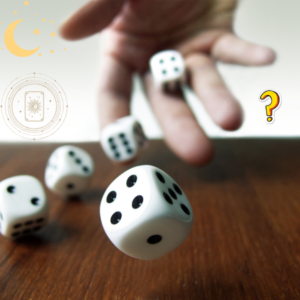Fluke: Does Everything Happen For a Reason?

As the title suggests, the basic idea of Fluke, by Brian Klaas, is that much of what happens in life -including our very existence- comes down to random chance. I don’t believe this, but it’s an interesting read nonetheless.
“Everything Doesn’t Happen For a Reason”
This is the title of a chapter, and typical of Klaas’s confidence in stating dogmatic opinions on subjects that can’t really be proven or disproven.
One odd thing about Klaas’s argument is that he equates individualism (which he really doesn’t like, as he repeatedly makes clear) with the “illusion” that life is not random. This, despite the fact, that individualism developed concurrently with the very type of scientific materialism Klaas espouses.
He rightly points out that non-Western cultures (and all cultures in the pre-modern era) don’t believe in anything like individualism. What he fails to mention in this context is that they don’t believe in a random, haphazard universe either.
“Western modernity, the dominant system of thoughts and beliefs in our world, has produced simplified myths to explain how change happens in our lives and in our societies. The conventional wisdom of separated individuals acting purposively and independently has become so pervasive that saying something like ‘Actually we’re all completely intertwined in a unified causal web of existence’ makes one sound like a New Age guru with a self help book, rather than someone proclaiming an observable, empirical fact.”
Ok, but none of this has anything to do with the book’s central thesis. Many people throughout the ages, including self help gurus, Buddhists, shamans, transpersonal psychologists, and many others have indeed proclaimed the connectedness of all life and existence while still believing in a meaningful universe where things do happen for a reason. So I find it puzzling that Klaas devotes so much energy to discrediting individualism as though it proves his point.
Free Will vs Determinism
In the last section of the book, Klaas reveals his extreme materialist-determinist agenda. He makes dogmatic statements such as “If libertarian free will is indeed what we have, then pretty much everything we know about science would have to be wrong.”

Klaas seems to want to reconcile the modern materialist’s love of randomness (or “flukes”) with a more old school style of determinism.
“So take your pick. Solve the puzzle your own way. But after reading this section, with your brain and body in exactly the state they’re currently in, I’m afraid it’s probably inevitable which solution you’ll choose. That choice, free as it feels, was likely affected by everything that came before you, infinitely stretching back into the mists of time.”
So every thought and action you take was set in motion by previous causes, going back to the beginning of time. This sounds like a slightly updated version of the clockwork universe of Enlightenment philosophers and scientists such as Descartes, Newton, and Leibniz in the 17th century. This is also related to Deism, the idea that God created the universe, set everything into motion, but after that never intervened in human affairs. Today, the Big Bang usually substitutes for God, but it’s the same idea. The world is basically a machine or clock whose every motion is predetermined -either by an apathetic Creator or by random chance.
This type of thinking was already outdated by the early 20th century when the discoveries of quantum mechanics usurped the Newtonian universe. Klaas does address the quantum realm but isn’t persuaded that it undermines determinism. With characteristic modesty, he dismisses as “nonsensical” the notion that quantum mechanics in any way “props up” free will. As he puts it,
“Yes, some aspects of our world may be irreducibly random. But if your choices deviate from the script of antecedent causes -that which came before- only due to randomness, well are you any more free? Nope. Your behavior being dictated by nature’s random-number generator isn’t freedom. No matter how much we water it down, free will won’t sprout from quantum dice.”
The notion that quantum phenomena are completely random is no more than an assumption. In fact, one of the most famous quantum principles of all, the Observer Effect, strongly suggests that consciousness influences reality. Does this conclusively prove that free will is valid? No, but it’s at least as plausible as the counterargument made by Klaas and other diehard determinists.
Jung and Synchronicity
Fluke does not mention Jung at all. I bring him up because Jung’s concept of synchronicity is a good example of how we can believe in an interconnected universe (as Klaas does) that is not completely random. Synchronicity refers to meaningful coincidence. Of course, ancient cultures took this kind of connectedness for granted; Jung only placed this way of looking at life in a modern Western intellectual framework.
How the Kantu Succeed With a Non-Random Strategy
Klaas unwittingly includes an example that undermines much of his thesis. He describes how the Kantu, an ethnic group from Indonesia, decide where to plant rice. As Klaas describes, they plant two crops: rubber and rice. Rubber grows easily while the ideal conditions for rice are unpredictable, depending on the weather. The Kantu use a method of augury, observing the flight of birds to tell them where to plant rice. Amazingly enough, this method apparently works, as the Kantu have more success with their crops than other communities in the region. Equally amazing is that Klaas dismisses this as a “random” strategy.
Note the typically (for a modern Western intellectual) condescending tone of these comments:
“…the Kantu had found, by superstitious accident, a highly effective way to diversify their agricultural portfolio. They did so not by trying to squeeze the last drop of efficiency out of farming based on a flawed theory that would afford them absolute control, but rather by randomizing the process as a means of coping with unavoidable uncertainty.”
Klaas is half right here. The Kantu have found a more effective strategy than “rational” forecasting based on past performance (the same type of often-wrong analysis used by economists and other forecasters). However, he’s completely wrong in calling their method “random.” Methods that look for meaning in nature’s patterns are using the principle of synchronicity, though they’ve been doing it for many centuries before Jung coined the term. Clearly too educated to believe in “superstitious” augury, he simply labels it “random” so it fits his argument. Just the way he labels quantum phenomena that we can’t put in a rational box “random,” he does the same with augury.
Klaas ends the book with this inspirational quote:
“We are each hitched to one another, which yields a profound gift: that everything we do matters, including whatever you decide to do now, when you close this book, and go out to explore that wonderful, maddening, infinitely complex world, that we call home.”
Sounds wonderful. But it also reveals how pointless it is to advocate for radical determinism. He can’t help but assume that you have the agency to choose “whatever you decide to do now...”
If you’re interested in free will, determinism, chance, and randomness, Fluke is worth reading. It’s the kind of book I enjoy even if I disagree with most of the author’s conclusions. In that way, it’s similar to Nassim Taleb’s work (who Klaas often quotes). In addition to his more famous Black Swan book, he wrote Fooled By Randomness, which has a similar point of view as Fluke. These topics are fundamental to our existence, so they’re worth looking at from multiple perspectives.
Fluke: Chance, Chaos, and Why Everything We Do Matters
